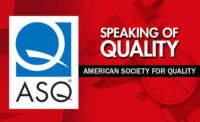More than 20 participants, from organizations such as Best Buy, Google, Hewlett-Packard, IBM and Pfizer, identified priority areas where quality and performance improvement can achieve the greatest effect and foster positive change.
"The impact of quality and organizational performance excellence on the future of businesses, industry, healthcare, and education is a critical area for discussion and action," says Paul Borawski, ASQ executive director and chief strategic officer. "The outcomes of the Future of Quality Dialogue will help ASQ shape strategic direction and priorities for our members now and in the years ahead."
The four priority areas include:
For more information, visit http://www.asq.org/knowledge-center/future-of-quality-dialogue.html.


